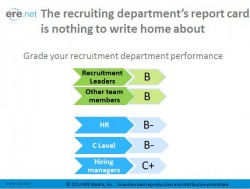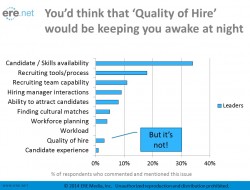With a self-assigned grade of B, and an even lower C+ from the hiring managers whose jobs they fill, recruiting leaders from companies large and small heard the news there’s much to do to improve those scores, and that the road is not going to get easier in the year ahead.
Speaking to the opening session of the Spring 2014 ERE Recruiting Conference & Expo in San Diego, ERE’s CEO Ron Mester told the hundreds of talent acquisition leaders in direct language that “You have a lot of work to do to improve … No one should be satisfied with a C+ or a B.”
The No. 1 hiring metric?
 At another point in his hour-long discussion of ERE’s State of Recruiting survey — a study that sampled recruiters, their leaders, their bosses, CEOs and hiring managers — Mester said that it will take a rethinking of the process to get recruiting leaders to an “A” grade. “Rethink it,” he urged. “Challenge everything that you’re doing today.”
At another point in his hour-long discussion of ERE’s State of Recruiting survey — a study that sampled recruiters, their leaders, their bosses, CEOs and hiring managers — Mester said that it will take a rethinking of the process to get recruiting leaders to an “A” grade. “Rethink it,” he urged. “Challenge everything that you’re doing today.”
Unveiling some of the findings of the March 2014 survey, Mester turned a spotlight on the disconnect between what the 1,300 respondents agree should be the key measures of recruiting’s performance and what recruiting leaders and their teams believe is where the actual emphasis lies.
For instance, he noted that across the groups of survey respondents — recruiting leaders, recruiters, hiring managers, HR leaders, and C-level executives — they all agree that quality of hire should be the No. 1 hiring metric. Hiring manager satisfaction, candidate satisfaction, and applicant quality were all ranked closely behind.
But when the question becomes what recruiters and their leaders think the quality of hire metric actually is — that is, what their bosses and hiring managers actually value — candidate satisfaction and applicant quality fall off in their importance, with time to fill rising near the top.
Ask recruiters and their leaders to name the issues that keep them awake at night, and quality of hire falls nearly to the bottom of the list. At the top, instead: candidate/skills availability and recruiting tools/process.
“You’d think that quality of hire would be keeping you awake at night,” Mester observed. “But it’s not,” he said, pointing to a slide showing that well under 10 percent of recruiting leaders worry about that very issue.
Survey conditions
That seeming contradiction isn’t the only one in the ERE survey.
Of the five top issues that most discourage recruiters, hiring managers factor in four of them. Yet, when asked what they are most encouraged by, their working relationship with hiring managers and their ability to act as a talent advisor to hiring managers took the top two spots.
Considering how hiring managers graded recruiting, Mester observed, “Are they listening to you? If they are not happy (with you), why are you happy?”
It was here that he most forcefully urged the conference audience (made up, mostly, of directors and vice presidents of talent acquisition) to “Rethink it. Rethink your relationship. Rethink what you are doing.”
Additional parts of the ERE survey will be rolled out in the coming weeks and months as the analysis of the extensive data continues. Mester didn’t say how much more information is yet to come, but during his keynote presentation, he offered several additional bits including:
- Most participants prefer the title talent acquisition to recruiting;
- Three-quarters of recruiting leaders report to HR now and most (69 percent) would rather that continue;
- Recruiting teams are forecast to grow between 3 and 5 percent by the end of the year, yet only those who now recruit would encourage others to recommend it as a career. Hiring managers are the least encouraging, and would actively discourage friends and colleagues from a recruiting job;
- Job satisfaction among recruiters and leaders is not very high. The “Job Satisfaction Score” (similar to a net promoter score) recruiters came in at -4 percent; recruiting leaders were +24 percent.
- Most respondents, including hiring managers and company executives, believe jobs are at least as hard to fill this year as in 2013, and, by large percentages, believe filling jobs will be even harder next year
